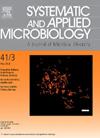Limosilactobacillus allomucosae sp. nov., a novel species isolated from wild boar faecal samples as a potential probiotic for domestic pigs
IF 4.2
2区 生物学
Q2 BIOTECHNOLOGY & APPLIED MICROBIOLOGY
引用次数: 0
Abstract
Six strains, WILCCON 0050, WILCCON 0051, WILCCON 0052, WILCCON 0053, WILCCON 0054, WILCCON 0055T, were isolated from four different faecal samples of wild boars on Pulau Ubin, Singapore, Singapore. Based on core genome phylogenetic analysis, the six strains formed a distinct clade within the genus Limosilactobacillus (Lm.), with the most closely related type strain being Lm. mucosae DSM 13345T. The minimum ANI, dDDH, and AAI values within these six strains were 97.8%, 78.8%, and 98.6%, respectively. In contrast, the ANI, dDDH, and AAI values with Lm. mucosae DSM 13345T were lower, ranging between 94.8–95.1%, 57.1–59.0%, and 95.9–97.0%, respectively. While ANI and AAI were close to the thresholds of 95% and 97% for bacterial species delineation, respectively, dDDH was significantly lower than the threshold value of 70%. Based on our phylogenomic, phenotypic and chemotaxonomic analyses, we propose a novel species with the name Limosilactobacillus allomucosae sp. nov., with WILCCON 0055T (DSM 117632T = LMG 33563T) as the designated type strain. In vitro investigations revealed the strains’ ability to break down raffinose-family oligosaccharides, and to utilize prebiotics such as xylo-oligosaccharides and galacturonic acid, thereby enhancing fibre digestion and nutrient absorption. Moreover, strong auto-aggregation properties, as well as resistance to low pH and porcine bile were observed, suggesting their potential survival and persistence during passage through the gut. The high bile tolerance of these strains appears to be attributed to their ability to deconjugate a wide range of conjugated bile compounds. In silico analysis indicated a strong potential for mucin-binding activity, which aids their colonization in the gut. These characteristics indicate the potential suitability of strains of Lm. allomucosae as probiotics for domestic pigs.
从野猪粪便样本中分离出的新物种 Limosilactobacillus allomucosae sp.
从新加坡乌滨岛(Pulau Ubin)四种不同的野猪粪便样本中分离出六株菌株,分别为 WILCCON 0050、WILCCON 0051、WILCCON 0052、WILCCON 0053、WILCCON 0054 和 WILCCON 0055T。根据核心基因组系统进化分析,这六株菌株在Limosilactobacillus(Lm.)属中形成了一个独特的支系,与之关系最密切的模式菌株是Lm.mucosae DSM 13345T。这六个菌株的最小 ANI、dDDH 和 AAI 值分别为 97.8%、78.8% 和 98.6%。相比之下,Lm. mucosae DSM 13345T 的 ANI、dDDH 和 AAI 值较低,分别为 94.8-95.1%、57.1-59.0% 和 95.9-97.0%。虽然 ANI 和 AAI 分别接近 95% 和 97% 的细菌物种划分阈值,但 dDDH 明显低于 70% 的阈值。根据系统发生组学、表型学和化学分类学分析,我们提出了一个新物种,命名为全口低硅乳酸杆菌(Limosilactobacillus allomucosae sp.nov.),WILCCON 0055T (DSM 117632T = LMG 33563T)为指定的模式菌株。体外研究显示,这些菌株能够分解棉子糖族低聚糖,并利用益生元(如木寡糖和半乳糖醛酸),从而促进纤维消化和营养吸收。此外,还观察到这些菌株具有很强的自动聚集特性,以及对低 pH 值和猪胆汁的耐受性,这表明它们在通过肠道时具有存活和持久的潜力。这些菌株对胆汁的高度耐受性似乎归因于它们对多种共轭胆汁化合物的解结合能力。硅学分析表明,这些菌株具有很强的粘蛋白结合活性,这有助于它们在肠道中定植。这些特征表明,异粘酵母菌株可能适合作为家猪的益生菌。
本文章由计算机程序翻译,如有差异,请以英文原文为准。
求助全文
约1分钟内获得全文
求助全文
来源期刊

Systematic and applied microbiology
生物-生物工程与应用微生物
CiteScore
7.50
自引率
5.90%
发文量
57
审稿时长
22 days
期刊介绍:
Systematic and Applied Microbiology deals with various aspects of microbial diversity and systematics of prokaryotes. It focuses on Bacteria and Archaea; eukaryotic microorganisms will only be considered in rare cases. The journal perceives a broad understanding of microbial diversity and encourages the submission of manuscripts from the following branches of microbiology:
 求助内容:
求助内容: 应助结果提醒方式:
应助结果提醒方式:


